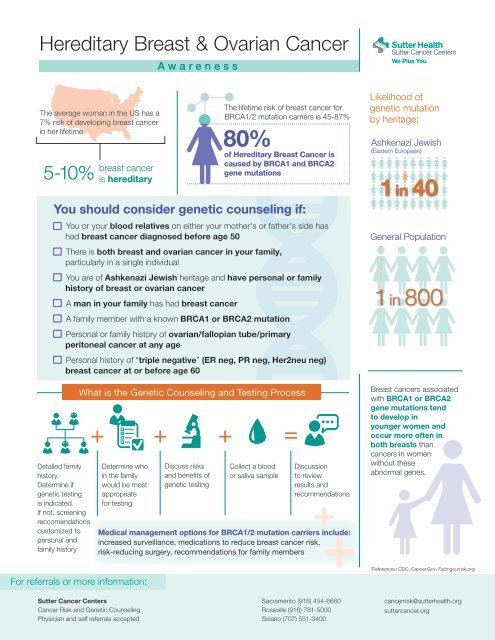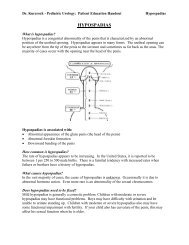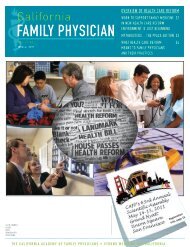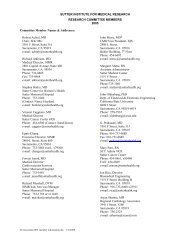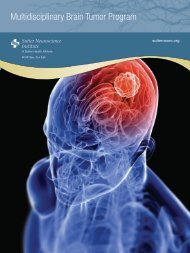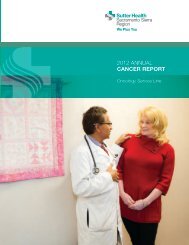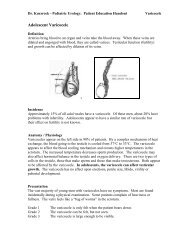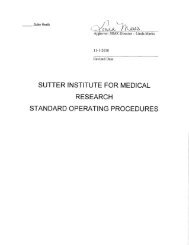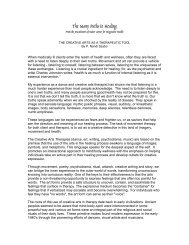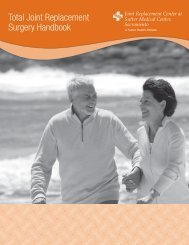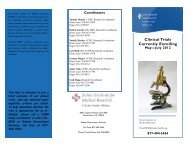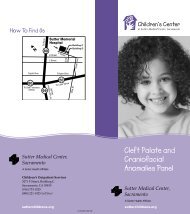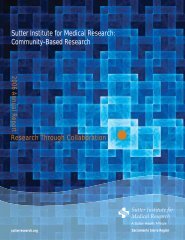Download Infographic - Sutter Health Sacramento Sierra Region
Download Infographic - Sutter Health Sacramento Sierra Region
Download Infographic - Sutter Health Sacramento Sierra Region
You also want an ePaper? Increase the reach of your titles
YUMPU automatically turns print PDFs into web optimized ePapers that Google loves.
Hereditary Breast & Ovarian CancerAwarenessThe average woman in the US has a7% risk of developing breast cancerin her lifetime5-10%breast canceris hereditaryThe lifetime risk of breast cancer forBRCA1/2 mutation carriers is 45-87%80%of Hereditary Breast Cancer iscaused by BRCA1 and BRCA2gene mutationsYou should consider genetic counseling if:Detailed familyhistory.Determine ifgenetic testingis indicated.If not, screeningreccomendationscustomized topersonal andfamily historyYou or your blood relatives on either your mother's or father's side hashad breast cancer diagnosed before age 50There is both breast and ovarian cancer in your family,particularly in a single individualYou are of Ashkenazi Jewish heritage and have personal or familyhistory of breast or ovarian cancerA man in your family has had breast cancerA family member with a known BRCA1 or BRCA2 mutationPersonal or family history of ovarian/fallopian tube/primaryperitoneal cancer at any agePersonal history of “triple negative” (ER neg, PR neg, Her2neu neg)breast cancer at or before age 60What is the Genetic Counseling and Testing ProcessDetermine whoin the familywould be mostappropriatefor testingFor referrals or more information:Discuss risksand benefits ofgenetic testingCollect a bloodor saliva sampleDiscussionto reviewresults andrecommendations++Medical management options for BRCA1/2 mutation carriers include:increased surveillance, medications to reduce breast cancer risk,risk-reducing surgery, recommendations for family membersLikelihood ofgenetic mutationby heritage:Ashkenazi Jewish(Eastern European)1 in 40General Population1 in 800Breast cancers associatedwith BRCA1 or BRCA2gene mutations tendto develop inyounger women andoccur more often inboth breasts thancancers in womenwithout theseabnormal genes.*References: CDC, Cancer.Gov, Facingourrisk.org<strong>Sutter</strong> Cancer CentersCancer Risk and Genetic CounselingPhysician and self referrals accepted<strong>Sacramento</strong> (916) 454-6660Roseville (916) 781-5000Solano (707) 551-3400cancerrisk@sutterhealth.orgsuttercancer.org
Hereditary Breast & Ovarian CancerAwarenessMedical Management forSyndrome Hereditary Breast and Ovarian CancerSTARTING ATAGE 18 Breast awarenessAGE 25 Clinical breast exams every six to 12 monthsAnnual mammogram and breast MRIDiscuss risk reducing bilateral mastectomyAGE 30 Consider transvaginal ultrasound and CA-125every six monthsAGE 35 Recommend risk-reducing bilateral salpingo-oophorectomyat age 35 or when childbearing is completedConsider chemoprevention options for breast and ovarian cancer<strong>Sutter</strong> Cancer CentersComprehensive Breast Cancer ProgramMedical OncologySurgical OncologyReconstructive SurgeryBreast Cancer NavigatorsCancer Risk and Genetic CounselingInfusion Therapy and Radiation OncologyNutrition CounselingSupport Groups and Healing Arts<strong>Sutter</strong> Cancer CentersLocations throughout the <strong>Sacramento</strong> <strong>Sierra</strong> <strong>Region</strong>. Learn more at suttercancer.org.


